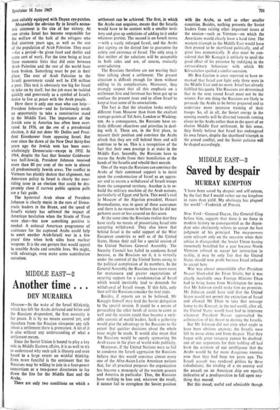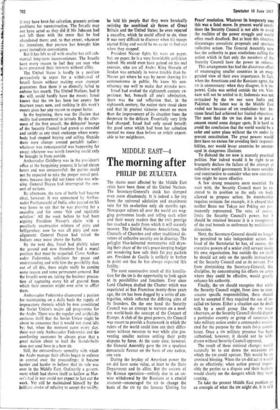Saved by despair
MIDDLE EAST-3 MURRAY KEMPTON
'I have been saved by despair and self-esteem, by the fact that I would rather see my kingdom in ruins than yield. My obstinacy has plagued the world.'—Frederick of Prussia.
New York—General Dayan, like General Giap before him, suggests that there is no force in modern history so consequential as the depen- dant who obstinately refuses to accept the best judgment of his principal. The mega powers seem relevant only on the occasion when their advice is disregarded; the Soviet Union having immensely benefited for a year because North Vietnam refused to accept her instruction in reality, it may be only fair that the United States should now profit because Israel refused to accept hers.
War was almost unavoidable after President Nasser blockaded the Tiran Straits; but it was clearly inevitable once Foreign Minister Eban had to bring home from Washington the news that Mr Johnson could make him no promises. Mr Johnson could have said that the United States would not permit the extinction of Israel and allowed Mr Eban to take that message home to the Knesset; in the real world, after all, the United States would have had to intervene whenever President Nasser approached the culmination of his threat to destroy the Israelis.
But Mr Johnson did not state what ought to have been obvious anyway; the Israelis were left to move alone and from despair. That they began with great savagery cannot be doubted; one of our arguments for their holding off had been the estimate of our intelligenoe that the Arabs would be far more dangerous enemies now than they had been ten years ago. The Israeli assault was rendered pitiless by these calculations; the strafing of a UN convoy and the assault on an American ship are equally indicative of a predisposition to fall upon any- thing that moved.
But this mood, useful and admirable though it may have been for salvation, presents serious problems for reconstruction. The Israelis may not have acted as they did if Mr Johnson had not left them with the sense that he had abandoned them; and, to that extent, whatever his intentions, that posture has brought him great immediate convenience. But it has left us all with smaller but still sub- stantial long-term inconveniences. The Israelis have every reason to feel they are men who have preserved their interests without allies.
The United States is hardly in a position persuasively to argue for a withdrawal of Israeli forces without making even stronger guarantees than those it so dismally failed to enforce last month. The United Nations, had it the will, could hardly have the means; Israel knows that the UN has been her enemy for fourteen years now, and nothing in this week's events gives her any reason to expect better.
in the beginning, there was the illusion that reality had commenced to intrude. By the after- noon of the first assault, the delegates' lounge of the Security Council had grown as crowded and untidy as any stock exchange where every- body had stopped buying and selling. Outside there were clumps around portable radios: whatever was consequential was happening far away; whatever was worth knowing could only be brought in from outside. Ambassador Goldberg was in the president's office at the bargaining process; it lasted eleven hours and was unsuccessful; the parties could not be expected to take the proper moral posi- tions, because they did not know who was win- ning. General Dayan had interrupted the con- cert of nations.
By afternoon, the turn of battle had become clear, however. It was announced by Ambas- sador Parthasarathi of India, who paused on his way home to say that he was pressing for a ceasefire and for some 'fair and equitable solution.' All the week before he had been arguing President Nasser's claim with a peculiarly unattractive mixture of piety and belligerence; now he was all piety and non- alignment. General Dayan had raised the Indians once more above the battle.
By the next day, Israel had plainly taken the ground and now therefore had a moral position that must be respected. Came Ambas- sador Federenko, solicitous for peace and understanding and with him the possibility that, out of all this, there might really be coming some reason and some permanent concord. But the Israelis went on, taking the business precau- tion of capturing every bit of ground from which their enemies might ever arise to afflict them.
Ambassador Federenko discovered a passion for maintaining on a daily basis the supply of imprecatory rhetoric which by now constituted the Soviet Union's major aid programme for the Arabs. There was the regular and artificially ominous thrill that the Soviet Union might be about to announce that it would not stand idly by; but, when the moment came every day, there was only Ambassador Federenko and the comforting assurance he always gives that a great nation about to hurl the thunderbolts does not send Jove in a bow tie.
Still, the extraordinary unreality with which the Arabs manage their affairs began to enforce its control over the proceedings; it became harder and harder to believe that its rule was over in the Middle East. Ordinarily a govern- ment which had shown itself as hollow as Nas- ser's had in war could not expect to last out the week. Yet still he maintained himself by the brilliant stroke of refusing to accept the reahVy; he told his people that they were heroically resisting the combined air forces of Great Britain and the United States; he even rejected a ceasefire, which he could afford to do, since fit was very difficult to discover when his troops started firing and would be no easier to find out when they stopped.
President Nasser fights his wars on paper, but, on paper, he is a very formidable politician indeed. He could even have gained on his real enemies, who are all Arabs; King Hussein of Jordan was certainly in worse trouble than he. Nasser got where he was by never showing his commonsense in public. He knew his con- stituency too well to make that mistake now.
Israel had evoked the eighteenth century ex- perience; but, beneath all one's admiration, there was the sad reflection that, in the eighteenth century, the nation state stood alone and that its greatest victories meant no more than the improvement of its situation from the desperate to the delicate. Essentially very little had changed; Israel had only saved herself; the good sense which had been her salvation seemed no more than before an article export- able to her neighbours.



































 Previous page
Previous page